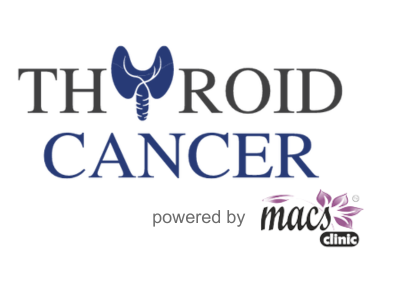“It’s not just about treating cancer—it’s about understanding it. When we explore our family history, we often unlock vital clues that empower us to act early, plan better, and live fully.”
— Dr. Sandeep Nayak, Surgical Oncologist, MACS Clinic, Bangalore
When people hear about thyroid cancer, one of the first questions that often comes up is, “Can I inherit it from my parents?” It is a concern that many share—especially those who have seen close family members struggle with the disease.
Whether you have been diagnosed, have a family history of thyroid issues, or are just trying to be proactive about your health, understanding the hereditary aspects of thyroid cancer can be a powerful first step.
What Is Thyroid Cancer?
Thyroid cancer occurs when cells in the thyroid gland—a butterfly-shaped gland in the neck—begin to grow uncontrollably. The thyroid gland plays a crucial role in regulating metabolism, heart rate, and body temperature by releasing essential hormones.

There are several types of thyroid cancer:
- Papillary Thyroid Cancer (PTC): The most common form, making up about 80% of all cases. It tends to grow slowly and generally responds well to treatment.
- Follicular Thyroid Cancer (FTC): Slightly more aggressive than papillary cancer and accounts for approximately 10–15% of cases. Early detection can improve outcomes.
- Medullary Thyroid Cancer (MTC): Less common, representing about 2–4% of cases. It is more likely to be inherited compared to other types, especially in association with certain genetic syndromes.
- Anaplastic Thyroid Cancer: A rare and aggressive form that is challenging to treat and extremely uncommon.
On a positive note, the overall thyroid cancer survival rate is high—especially when the cancer is detected and treated early. Individual results may vary.
Is Thyroid Cancer Hereditary?
Most thyroid cancers are not inherited—they are sporadic, meaning they happen due to unknown causes or environmental factors. However, a small percentage (about 5–10%) may be hereditary.
Here’s where things get more specific:
- Medullary thyroid cancer can run in families and is strongly associated with inherited mutations, particularly in the RET gene.
- Some people may inherit a predisposition for non-medullary thyroid cancers as well, especially if multiple family members have been diagnosed, although this is less common.
This doesn’t mean you will definitely get thyroid cancer if a family member has had it—but your risk may be higher.
Types of Hereditary Thyroid Cancer Syndromes
Several hereditary syndromes are linked to thyroid cancer, often through specific gene mutations. Understanding these syndromes is important for early detection and management:
- Multiple Endocrine Neoplasia Type 2 (MEN2): Associated with medullary thyroid cancer. Caused by mutations in the RET gene.
- Familial Adenomatous Polyposis (FAP): Commonly linked to colorectal cancer, but can also increase the risk of papillary thyroid cancer.
- Cowden Syndrome: A genetic disorder that increases the risk of several cancers, including follicular and other types of thyroid cancer.
- Carney Complex and Werner Syndrome: Rare syndromes that can be associated with thyroid tumor development.
These conditions may also increase the risk for other types of tumors—so knowing about them can help with broader health planning.
When Should You Consider Genetic Testing?

You might consider thyroid cancer genetic testing if:
- More than one close relative has had thyroid cancer.
- A family member was diagnosed at a young age.
- You or a family member has been diagnosed with medullary thyroid cancer.
- There’s a known history of hereditary syndromes like MEN2 or Cowden Syndrome.
Genetic testing usually involves a blood sample, and sometimes a saliva sample. A genetic counselor or qualified doctor can help interpret the results and guide next steps.
Preventive Steps If You Have a Family History of Thyroid Cancer

If you discover that you carry a genetic risk, you don’t have to sit and wait. There are proactive steps you can take:
- Regular screening: Yearly neck ultrasounds and relevant blood tests (such as calcitonin for medullary thyroid cancer) can help detect changes early.
- Preventive surgery: In high-risk cases like MEN2, preventive removal of the thyroid (prophylactic thyroidectomy) may be recommended after thorough consultation with a qualified doctor.
- Lifestyle changes: Maintain a balanced diet, avoid unnecessary radiation exposure, and manage stress.
- Monitoring other health risks: Since some syndromes affect multiple organs, broader check-ups and regular follow-up with your healthcare provider might be needed.
Wrap Up
While most thyroid cancers aren’t hereditary, understanding your family’s medical history can offer vital clues. If there’s a pattern, consider genetic counseling and regular screenings after consulting a qualified doctor. It’s not about fear—it’s about empowerment.
Whether you have a confirmed genetic risk or just want to stay informed, knowledge and regular medical consultation are your best defense.
Take charge of your thyroid health today. Speak with a specialist and know your options.
Frequently Asked Questions
Can I inherit thyroid cancer from my parents?
What gene is responsible for hereditary thyroid cancer?
What is the most common genetic mutation linked to hereditary thyroid cancer?
Can lifestyle changes reduce the risk of thyroid cancer if it’s hereditary?
What age should I start screening if I have a genetic risk?
Disclaimer: The information provided here is for educational purposes only. Individual results may vary. Please consult a qualified doctor for personalized advice.

